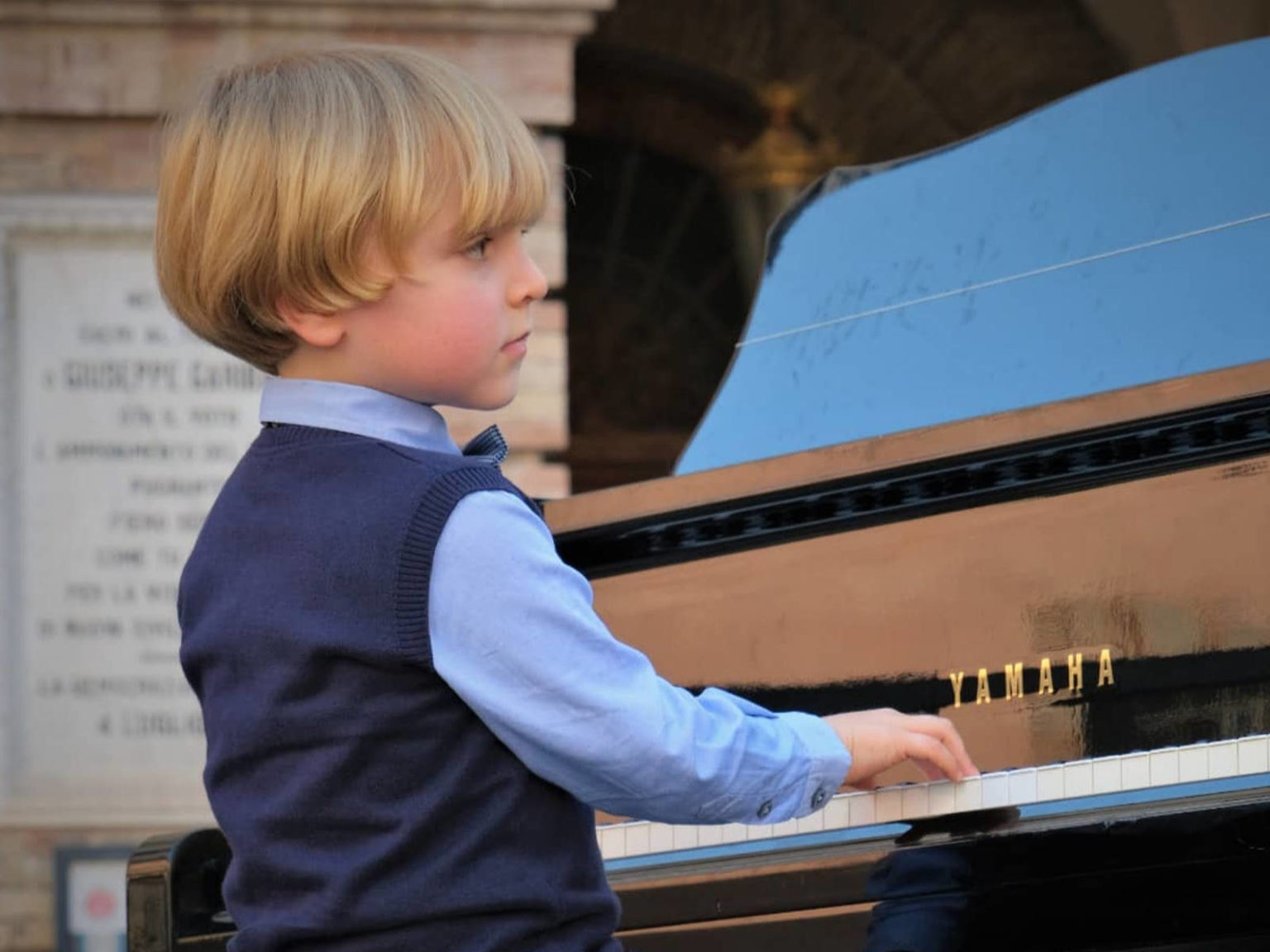In a quiet town tucked between the hills of central Italy, where cobblestone streets echoed with church bells and the scent of espresso drifted from sleepy cafés, a small miracle unfolded inside a modest concert hall.
It wasn’t the kind of venue known for dazzling performances or international debuts. The Teatro delle Muse was charming and old, the kind of place where the curtains creaked a little and the lights flickered if the weather turned. But that afternoon, something unforgettable would happen.
In the second row sat parents, teachers, retirees — many there simply to support a cousin, niece, or neighbor playing in the community recital. No one expected brilliance. It was a local music school showcase. Sweet, earnest, and full of mistakes that would be met with warm applause.
Then the announcer cleared her throat.
“And now, performing Sonata No. 16 in C Major by Mozart… Alberto Cartuccia Cingolani.”
There was a small ripple of murmurs. A few heads tilted in curiosity. A child? Playing Mozart?
From behind the curtain emerged a boy so small he seemed more suited for crayons than classical piano. Dressed in a crisp white shirt and tiny navy trousers, he walked with quiet determination toward the gleaming grand piano.
Alberto didn’t smile. He didn’t wave.
He simply climbed onto the bench, adjusted himself carefully — his feet nowhere near the pedals — lifted the lid, and placed his fingers on the keys.
Then silence.
The kind of silence that holds its breath.
And then — music.
It wasn’t just the clarity of the notes or the startling precision that caught the audience off guard. It was the feel. Alberto didn’t just play Mozart — he understood him. The bouncing charm, the graceful turns, the quiet joy tucked between each phrase. Every run, every trill, every delicate resolution rang out as though Mozart had whispered the secrets directly into his ear.
People leaned forward. Phones quietly came out of pockets. A few in the back exchanged stunned glances. They weren’t witnessing a recital.
They were witnessing a prodigy.
Alberto had begun playing just two years earlier. It was a time when most of the world was in lockdown, uncertain and afraid. But inside the Cingolani home, music never stopped.
His mother, Alessia, an opera singer with a voice that once filled cathedrals, had turned the living room into a makeshift rehearsal space. His father, Simone, a pianist and quiet perfectionist, used the dining table for lesson plans and sheet music.
They hadn’t planned on teaching Alberto. At least not so soon.
But one day, as Simone practiced, he noticed Alberto standing nearby, not just listening — mimicking. Tiny fingers hovering in the air, pressing imaginary keys with surprising accuracy. When Simone paused, Alberto pointed at the piano and said simply, “Again.”
From then on, lessons began. Gently. Casually. Alessia made it a game. Simone introduced rhythms like bedtime stories.
Alberto absorbed it all like sunlight.
Back at the theater, the final notes of the sonata shimmered through the room before evaporating into silence. There was a beat — one long, disbelieving beat — and then the audience erupted.
Not polite applause. Not “how cute” claps.
Real, thunderous, stand-up-out-of-your-seat kind of applause.
Alberto blinked. It was as if he hadn’t noticed the audience until that very moment. He turned, nodded shyly, and gave a tiny bow.
But the clapping didn’t stop.
A voice called out, “Encore!”
It startled him.
Simone, watching from the side stage, began to rise, unsure. Alessia held his hand.
And then — Alberto returned to the bench.
He whispered something to the stagehand, who scrambled for a moment, then handed over a page of music. Alberto set it on the stand, took a breath… and began Chopin’s Prelude in E minor.
Softer. Sadder. Soulful in a way that no five-year-old should be able to feel — and yet, somehow, he did. His interpretation wasn’t perfect. A few hesitations. One wrong note. But none of that mattered.
What mattered was the way the music lived in him.
He didn’t play to impress. He played because he loved it.
That night, a video of his performance hit social media. Then the local news. Then, in the blink of an eye, Europe.
By six, he had played in Vienna. At seven, in Madrid. And at eight, he stood in the Vatican’s grand auditorium, accepting the “Music Prize” at the Giuseppe Sciacca Awards — his parents beside him, beaming.
But if you asked Alberto what his favorite concert was, he wouldn’t mention the Vatican, or the time he got a standing ovation from a room full of critics in Paris.
He’d say, “The one where I got to play again.”
Because for Alberto, the real magic wasn’t in being watched. It was in being asked to keep going.
And somewhere, far from flashing cameras and viral headlines, a quiet Italian theater keeps his little bench by the piano polished — just in case he ever comes back.
